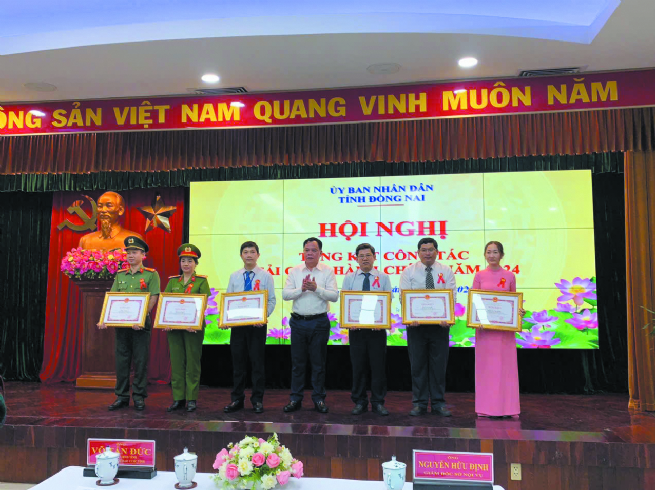Dong Nai defines administrative reform as an innovative action to improve the work performance of the government apparatus at all levels, facilitate people and businesses, and contribute to promoting socioeconomic development. Enabled by the strong direction of all levels of authorities and close inter-agency coordination, administrative reform has produced optimistic outcomes.
Transformational changes
In 2024, the Chairman of the Dong Nai Provincial People's Committee issued 104 decisions to promulgate a set of administrative procedures, including 393 new administrative procedures (299 at provincial level, 98 at district level and 21 at commune level), 539 revised administrative procedures (472 at provincial level, 64 at district level and 30 at commune level), and 324 abolished administrative procedures (302 at provincial level, 53 at district level and 18 at commune level). After being announced, all administrative procedures were updated into the National Administrative Procedure Database and publicly listed on the Provincial Public Administration Service Center and the National Public Service Portal.

In addition, the progress and result of handling administrative procedures was publicly announced on the province's Electronic Information Portal, the Administrative Reform Information Portal and the Public Service Lookup Portal where people can easily look up the status of their records. Cases that are behind schedule, require supplemental information, or are suspended from settlement or rejected will be resolved in line with the law and tracked on the electronic single-window software.
In addition to reforming administrative procedures, the province has focused on applying information technology to management and operation. 100% of documents transmitted among administrative agencies are performed electronically, helping reduce costs and shorten processing time.
The province has also invested in technical infrastructure to support digital transformation, develop shared databases and open databases for building the digital government. To date, Dong Nai has established basic databases such as citizens, population, household registration, land, public employees and administrative procedures. Provincial and local agencies have deployed specialized database management software to simulate all activities and form shared data in each agency, unit and locality.
Toward a modern and professional administrative service
Along with reforming administrative procedures and modernizing the administrative system, Dong Nai province has concentrated on rearranging and perfecting its streamlined, effective and efficient organizational structure. In 2024, the Provincial People's Committee issued a decision to reorganize the apparatus of its three specialized agencies; submitted to the Prime Minister for consideration the establishment of the Dong Nai Investment, Trade and Tourism Promotion Center; and approved the scheme of seven public service units. This is an important step to increase the autonomy and activeness of subordinate agencies while avoiding overlapping and replicating work.
|
Dong Nai has risen to 8th place nationwide in the Public Administration Reform Index (PAR Index) with 90.69 points, advancing 24 places from 2023. This is a testament to the province's tireless effort and strong determination in building an effective administration and providing the best service to the masses and businesses. |
At the same time, the province approved the job position scheme of provincial agencies and public service units, raised the quality of public employees by training and fostering professional qualifications and evaluating work performance. All public service units developed and adopted internal spending regulations, and practiced regular thrift in spending.
The province pays special attention to enhancing public ethics, sense of responsibility and service attitude of civil servants. Training programs on administrative reform, administrative procedure control and single-window mechanism application are regularly organized.
Many localities in the province have adopted the "Friendly, popular" government model, focusing on professional attitude, conduct, gestures and language, while banning authoritarianism, arrogance, bureaucracy, insensitivity, irresponsibility, corruption, waste, group interests, flattery, lobbying, deceit and abuse of power for personal interest. As a result, people are increasingly satisfied with the quality of public administrative services.
Nguyen Bach (Vietnam Business Forum)